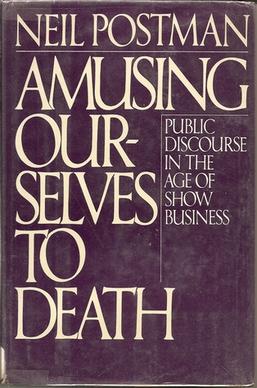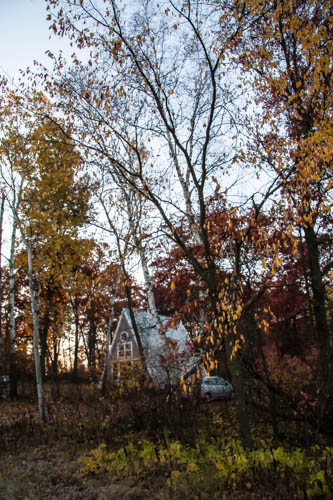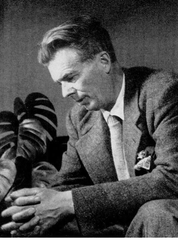INTRODUCTION

Funny how things come together, crisscross, intersect, lead us down roads no one has ever walked before. Neil Postman offers insight into what’s happening. I read it one morning last week at the cabin, away from everything that entertains and distracts me from that little plot of land on the edge of the wetland in Central Minnesota.
William Britton’s Wisdom from the Margins: Daily Readings‘ excerpts from Neil Postman’s Amusing Ourselves to Death: Public Discourse in the Age of Show Business painted a picture that felt true, like a revelation pealing back the curtain to find that Lewis Carroll’s walk down the yellow brick road with Alice, the lion, the tin man, and the scarecrow is outdated. Oz is no longer a harmless little old man.
Neil Postman on Orwell and Huxley
Contrary to popular belief. . . Huxley [Brave New World] and Orwell [1984] did not prophesy the same thing. Orwell warns that we will be overcome by an externally imposed oppression. But in Huxley’s vision, no Big Brother is required to deprive people of their autonomy, maturity and history. As he saw it, people will come to love oppression, to adore the technologies that undo their capacity to think.
What Orwell feared were those who would ban books. What Huxley fears was that there would be no reason to ban a book, for there would be no one who wanted to read one. Orwell feared those who would deprive us of information. Huxley feared those who would give us so much those that we would be reduced to passivity and egoism. Orwell feared that the truth would be concealed from us. Huxley feared the truth would be drowned in a sea of irrelevance. Orwell feared we would become a captive culture. Huxley feared we would become a trivial culture, preoccupied with some equivalent of feelies, the orgy porgy, and the centripetal bumblepuppy . . . . In 1984, Huxley added, people are controlled by inflicting pain. In Brave New World, they are controlled by inflicting pleasure. In short, Orwell feared that what we hate will ruin us. Huxley feared that what we love will ruin us. This book is about the possibility that Huxley, not Orwell, was right.
Neil Postman, Amusing Ourselves to Death
—Neil Postman, Amusing Ourselves to Death
The wetland pond, the flyway, and return home

At the cabin, the water in the wetland is unusually high this year because of record-breaking rainfall. The flocks of Buffleheads and other non-diving ducks have by-passed their familiar stop on the flyway; the water is too deep to for them to reach the food sources below. Only the long-necked Trumpeter Swans, Sandhill Cranes, and Canadian Geese, and the diving Loons and Mergansers that can reach the bottom have stopped by this year.
Leaving the cabin and the wetland lead home to the world Huxley feared where the truth is drowned in a sea of irrelevance. We settle back into the lounge chairs in front of the television and flip through Netflix, YouTube, and other means of entertainment in what Postman later called the Technopolis in which our capacity for critical thought is numbed.
The new normal
We turn on the evening news and see two very different versions of Speaker of the House Nancy Pelosi speaking to the press. One is real. The other is altered by technology that deceives viewers into believing the Speaker is drunk, on drugs, or mentally impaired by slowing and altering the pace of her speech. The culture of amusing ourselves to death in the Technopolis distorts truth into propaganda, the first wave of what will become the new normal.

We’re not in make-believe Mayberry anymore. What we love — entertainment — is drowning us. In the world foreseen by Huxley, Orwell, and Postman, truth is hard to find. “Where there is no critical perspective, no detached observation, no time to ask the pertinent questions, how can one avoid being deluded and confused?” wrote Thomas Merton in Faith and Violence: Christian Teaching and Christian Practice.
Only the long-necked Trumpeter Swans, Sandhill Cranes, and Canadian Geese, and the smaller, deep-diving Loons and Mergansers can reach or swim to the bottom to see what’s real and what’s not in the Technopolis. William Britton’s Wisdom from the Margins with Neil Postman, Aldous Huxley, George Orwell, and Thomas Merton took me there this morning.
— Gordon C. Stewart, Chaska, MN, May 26, 2019

We are in very scary times. So glad you have a beautiful little corner of the woods in which to escape and reflect, Gordon.
LikeLike
Good Morning, Massachusetts! What we don’t have in the woods is the ocean. But we do have more than 10,000 lakes, lots of wetlands, and places like the Pea Pod to get away from the noise. The only scary things at the cabin are black bears, skunks, and owls. BTW, Wilbur/Wilhelmina has returned as our only neighbor — under the cabin!
LikeLiked by 1 person
Having read both authors, but having read a lot more of Huxley than Orwell, I’m inclined to think that Huxley had our number better than most. I know a lot more people who don’t read at all than are prevented from reading. If books were banned tomorrow, they would not would even miss them.
That is frightening.
LikeLike
Hi, Marilyn. Thanks for the comment. Addition to your comment: even at the Barnes and Noble coffee shop, those who DO read are mostly reading on a kindle, not from a book in their hands. The kindle versions are much cheaper. They also move us further down the road of Technopolis. Old fudge-duddies: “Unit!”
LikeLike
I appreciate this — yes. But I am mostly impressed by the photo of the cabin. Just looking at it is restful.
LikeLike
It is restful, Mona. Thanks.
LikeLike